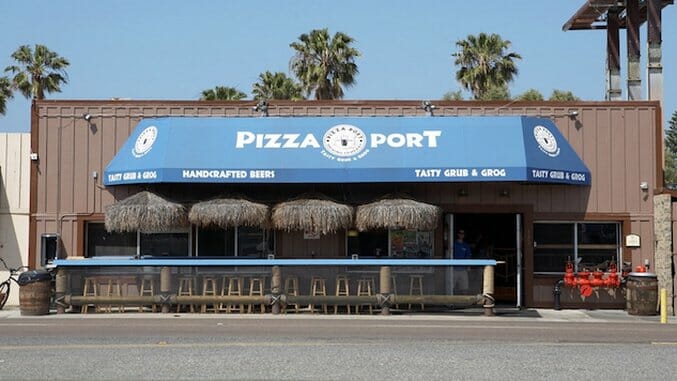From Pizza Port to The Hop Concept: SoCal’s Craft Beer Dynasty Explained
All photos via Pizza Port/Lost Abbey/Port Brewing
Pizza Port is undeniably influential in the Southern California beer scene. What began as a family business in a rundown pizza parlor in coastal San Diego, California has grown into a chain of brewpubs with multiple locations, several related brands, and more than a little confusion in the craft beer marketplace. Let’s untangle the connections between the Pizza Port brewpubs, the offshoot breweries, and the other brands that share the family DNA.
Pizza Port Brewing Brewpubs
The Pizza Port story started when siblings Gina and Vince Marsaglia purchased a rundown pizza joint in the laidback town of Solana Beach some 20 miles north of downtown San Diego. This was 1987, before even Karl Strauss had opened a brewery in San Diego and rekindled beer culture in Southern California. Vince, the younger Marsaglia, started homebrewing in the storage area of the restaurant, and before long Pizza Port made the transition from restaurant to full fledged brewpub. The first house made brews began pouring in 1992, and Pizza Port spent five years developing a reputation as a unique spot to grab some “grub and grog” in San Diego. In 1997, the siblings opened a second location a dozen miles north in Carlsbad, California. That year they also hired a new brewer to take over in Solana Beach, and the addition of Tomme Arthur to the Pizza Port family signaled the next chapter.
Arthur brewed at Cervecerias La Cruda in downtown San Diego (winning GABF gold there in 1996), then worked at the yeast bank and supplier White Labs briefly before joining the Pizza Port team. With Arthur as Head Brewer, the Solana Beach Pizza Port location won 13 GABF medals and a host of other accolades. Beers like Swami’s IPA, Ponto Pale Ale, and Midnight Expressions Schwarzbier drew in crowds from across SoCal.
As the Pizza Port brand grew in reputation and influence in Southern California, demand for the brews grew, and the pubs seemed to always be full of local beer lovers. The Marsaglia siblings opened a third location in Carlsbad (1997), then a fourth in San Clemente (2003). Pizza Port was named the Small Brewpub of the Year at the Great American Beer Festival in 2003 and 2004. A production brewery was announced in 2006 (more on this in a minute), in 2008 the brand added a bottle shop next to the Carlsbad location, and another pub opened in 2010 in Ocean Beach. Each of the Pizza Port Brewpubs has an independent crew of brewers who develop their own recipes and signature styles. Recipes get shared between the locations, but “the pubs can brew whatever they want as long as their customers are happy,” says Sean Farrell — the director of Brewing Operations for the chain of brewpubs.
Port Brewing & The Lost Abbey

As the craft beer scene in San Diego went from simmering to a full-on boil in the early years of the 21st century, the Marsaglias looked for ways to increase production of Pizza Port beers. Nearby Stone Brewing was also growing quickly, and in 2005 the Escondido-based brewery moved into a new, larger home. Arthur and the Marsaglias saw the opportunity to launch a production brewery, and they formed a partnership to take over Stone’s original brewery. Arthur had also developed a book of Belgian-inspired beers while brewing at Pizza Port Solana Beach — the Overhead series — and his love of the Belgian traditions continued to drive his creativity. The team decided to split the new brewery into two distinct brands. They’d brew bigger batches of the most popular Pizza Port brews for distribution as Port Brewing, and Arthur would have free rein to plunge down the Belgian beer rabbit hole under The Lost Abbey name.
As Port Brewing bottles flowed from the Escondido brewery, Belgian brews developed with feedback from tasting room visitors. In 2007 Port Brewing was named Small Brewery of the Year at GABF, and Arthur has earned a pile of medals and awards for The Lost Abbey’s beers. There are five year-round bottled beers from Port Brewing along with seven seasonal brews and two barrel-aged variants. Port also makes a handful of draft-only beers with a focus on lower-ABV offerings such as the exceptional Dawn Patrol dark mild ale. The Lost Abbey produces six year-round brews and a dozen or more seasonal and special release bottles, plus the tap-only experimentations and some of craft beer’s most sought-after “whales” (Duck Duck Gooze, Cable Car).
-

-

-

-

-

-

-

-

-

-

-

-

-

-

-

-

-

-

-

-

-

-

-

-

-

-

-

-

-

-

-

-

-

-

-

-

-

-

-

-










































